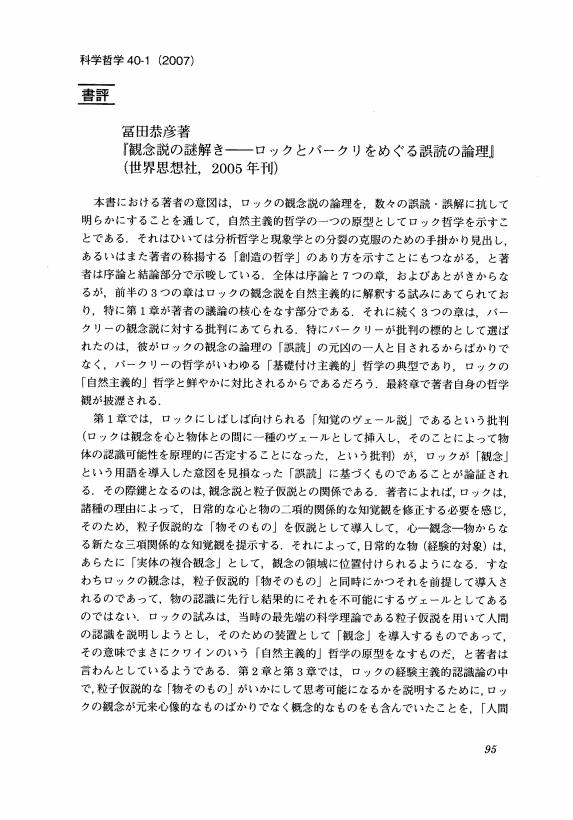3 0 0 0 OA 書評
1 0 0 0 OA 書評
1 0 0 0 OA 書評
1 0 0 0 OA 書評
- 著者
- 中釜 浩一他
- 出版者
- 日本科学哲学会
- 雑誌
- 科学哲学 (ISSN:02893428)
- 巻号頁・発行日
- vol.40, no.1, pp.95-102, 2007-07-30 (Released:2009-05-29)
1 0 0 0 OA 説明と形而上学的コミットメント
- 著者
- 中釜 浩一
- 出版者
- 日本科学哲学会
- 雑誌
- 科学哲学 (ISSN:02893428)
- 巻号頁・発行日
- vol.26, pp.1-13, 1993-11-20 (Released:2009-05-29)
- 被引用文献数
- 1
1 0 0 0 OA プラトン的直観
- 著者
- 中釜 浩一
- 出版者
- 法政大学文学部
- 雑誌
- 法政大学文学部紀要 = Bulletin of the Faculty of Letters, Hosei University (ISSN:04412486)
- 巻号頁・発行日
- vol.78, pp.11-19, 2019-03-18
In this paper, I discuss that ① What is the motivation of the Plato’s theory of Ideas, ② Why many philosophers, especially nominalists, have criticized Plato’s theory, and ③ in spite of these severe criticisms, why Platonic Intuition has survived for so many years.What motivates Plato’s theory of Ideas is the naïve semantics to explain intuitively our understanding of the meanings of everyday sentences. But theory of Ideas has some fatal drawbacks. To show these drawbacks, I use P. Benacerraf’s argument of mathematical knowledge and M. Dummett’s argument concerning mathematical infinity. In a word, Plato’s Ideas are unknowable and incommunicable entities and so they cannot be used as the tool for explanation of our objective knowledge.But despite of these theoretical problems, I argue that we cannot actually do without presupposing Platonic Intuition, and that to raise this paradoxical situation and to challenge our inquiries to go further is the Merit of Plato’s Philosophy.
1 0 0 0 OA できごとと対象―ホワイトヘッド科学哲学の中心概念―
- 著者
- 中釜 浩一
- 出版者
- 京都大学哲学論叢刊行会
- 雑誌
- 哲学論叢 (ISSN:0914143X)
- 巻号頁・発行日
- vol.13, pp.33-44, 1986-07-01




